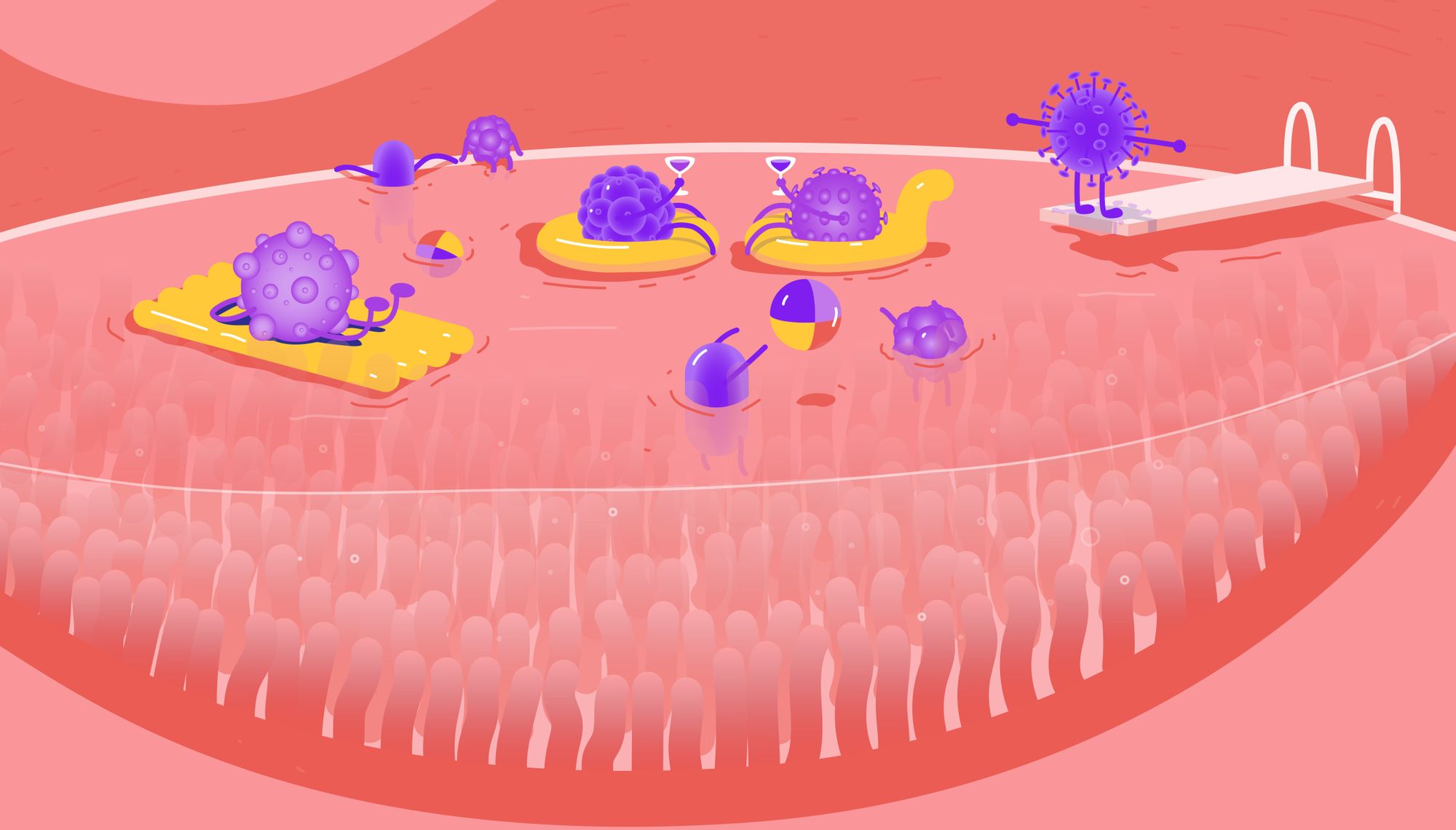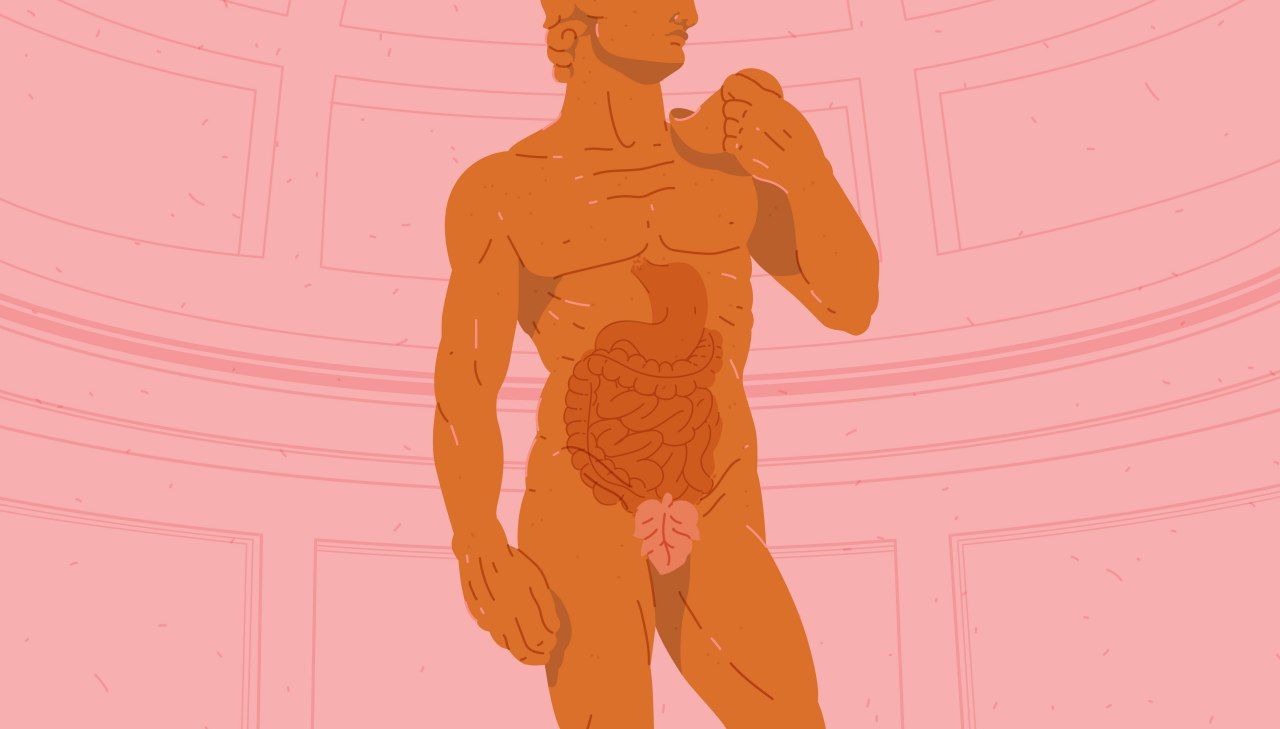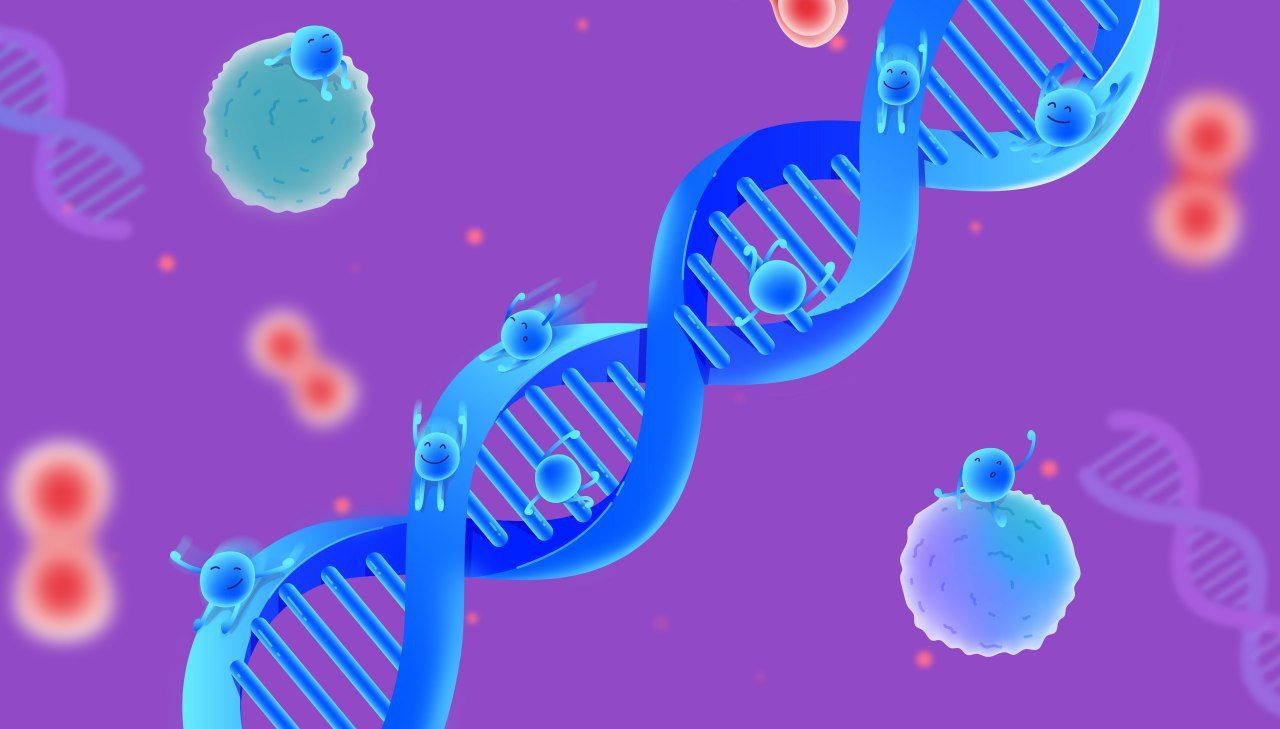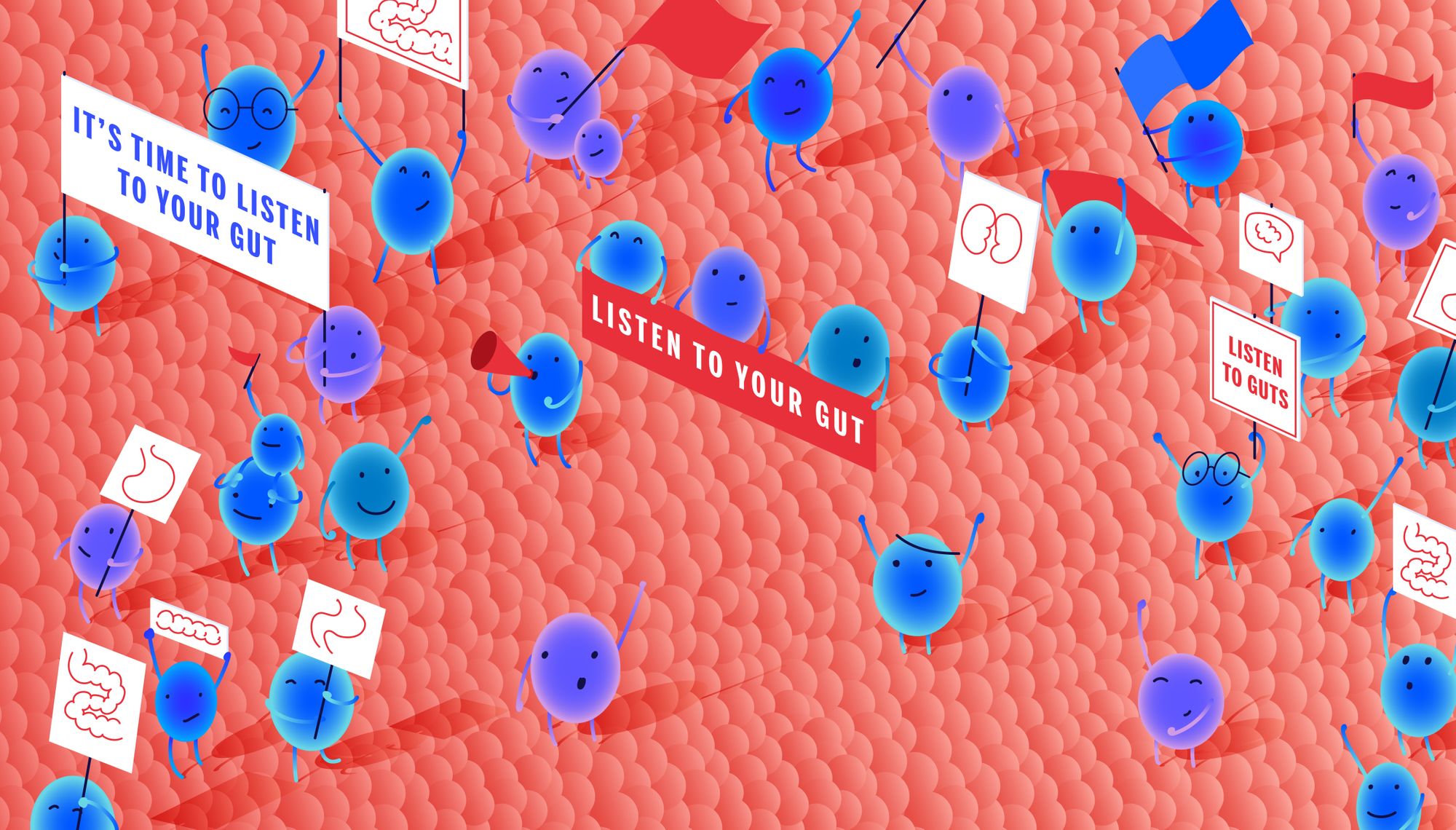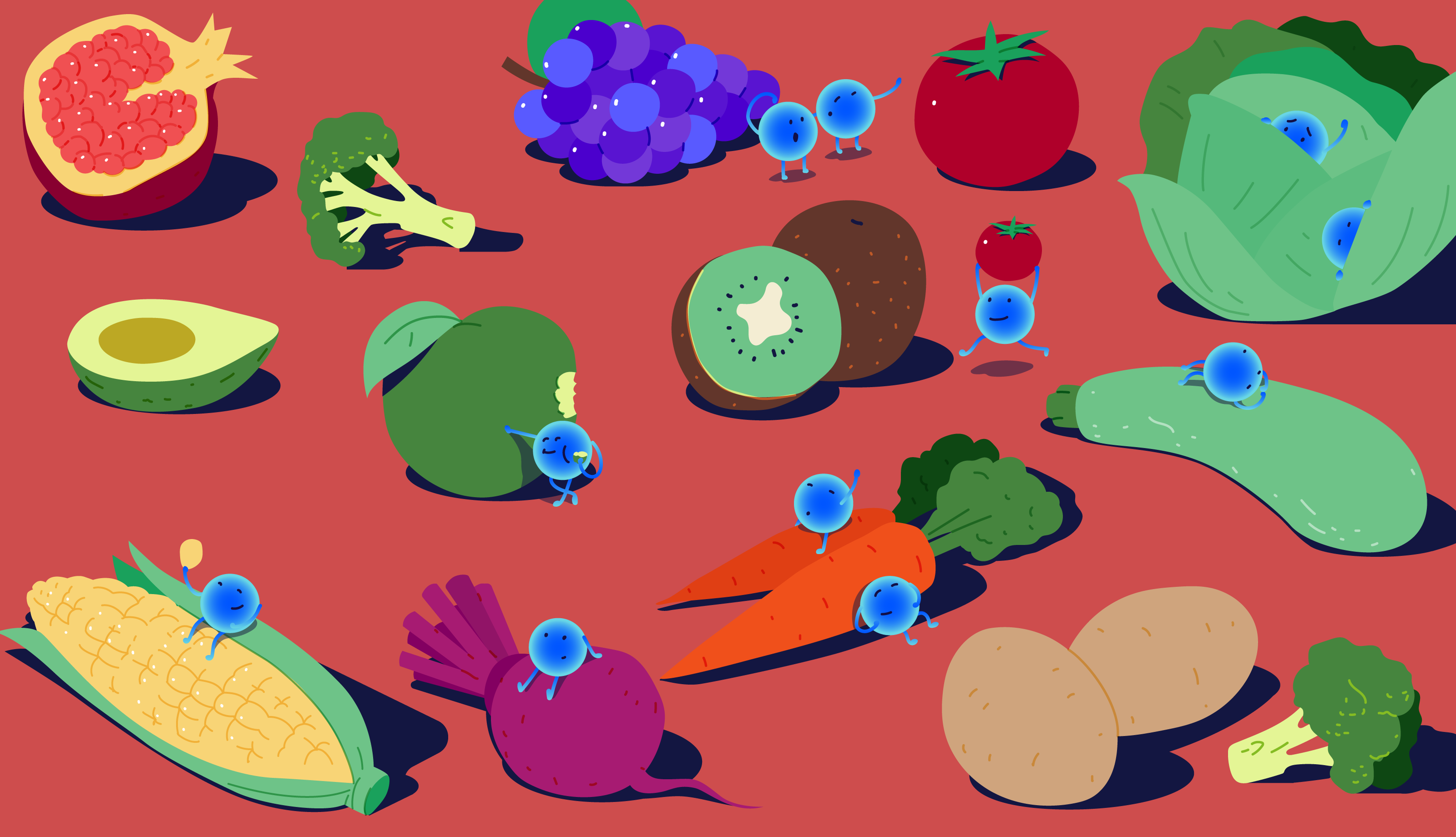Here are the facts on probiotic Lactobacillus for your microbiome, health, and mind.
These microbes are VIP members of a happy and balanced gut microbiome - that's why you’ve probably seen them advertised on probiotic yoghurt pots and kefir bottles. You might also know them under a different name: Lactic Acid Bacteria (LAB).
However, you can be forgiven for not entirely knowing what they really do or even how they work, but don’t worry, you’re not the only one. We’re going to take a closer look in this article.
Table of contents
- How did they get there?
- Lactobacillus and gut health
- Lactobacillus and whole body health
- Probiotic benefits for health
- Mood, mental health, and probiotics
- Lactobacillus species in mental health
- How to eat for better Lactobacillus levels
- Foods for Lactobacillus growth
Your gut may technically belong to you, but it’s also home to trillions of bacterial cells. These cells reside in your large intestine and carry out daily functions you may not have been aware of to help keep you healthy.
These microbes help break down fibre from your diet and transform it into good things needed for your health, like short-chain fatty acids and vitamins.
Diversity of bacteria within the gut is important, but if this becomes imbalanced, it can lead to dysbiosis. Not only can this cause side effects like cramps, gas, and diarrhea, but also causes inflammation with several diseases, and even affect your mood.
Lactobacillus is a valuable weapon in our gut armory. Alongside their other bacterial counterparts, they help protect your body from chronic diseases like type 2 diabetes and inflammatory bowel disease (Crohn’s and ulcerative colitis).
For this reason, Lactobacillus is an important member of your gut microbiome. They help protect from disease, and they also have ways of stopping pathogens from colonising the gut, including the release of antimicrobial substances in response to invaders.
This genus of microbes breaks down dietary fibers and phytonutrients (like polyphenols) which have beneficial effects for your health. What’s more, Lactobacillus even helps to feed other bacteria in your gut, such as the ones that produce butyrate (which the cells in your gut lining need for energy).
How did they get there?
Lactobacillus are with us from the start and continue to perform important health functions for us throughout our lives.
It might not be something you want to imagine, but when you came out of your mother’s vagina, her internal lady parts would have been thriving with these microbes. They coated you on the way out too.
Birth is the first major colonisation that your gut microbiota is subjected to. That's why scientists call it a "bacterial baptism", and Lactobacillus is the dominant microbe of the vaginal microbiome.
We love this animated short by TED about the gut microbiome
Breast milk is also a fundamental part of the infant’s gut microbiome because it contains nutrients for bacteria growth like prebiotic human milk oligosaccharides (HMOs). HMOs are broken down in the gut to make short-chain fatty acids (SCFAs) which promote the growth of both Bifidobacteria and Lactobacillus.
But because the development of your gut microbiome and your immune system are linked, research suggests that children born via c-section are more likely to develop immune-related disorders compared to those born vaginally.
There’s no doubt that childbirth is traumatic, and there isn’t such a thing as a perfect birth. So, if, like many, you were born by cesarean or were fed formula milk, don’t sweat it. There are things you can do today to help your gut microbes!
Lactobacillus for gut health
These microbes are able to stick to the cells and mucous of the intestinal lining, which explains why they are members of our gut microbiome. It is from here that they do their good work.
This genus of microbes fulfill several beneficial health-promoting functions for us, the hosts. That's why they are probiotic. They also promote the growth of other beneficial bacteria in our microbiome, which makes them pretty upstanding members of the ecosystem.
The production of lactate and acetate from carbohydrates (sources of prebiotic dietary fibers) is an important factor in the pH of the gut. They help to keep the acidity of the gut balanced in a way that encourages beneficial and commensal (harmless) species while deterring invaders that could make you sick.
Acetate is the most abundant SCFA in the large intestine and is produced by both Bifidobacteria and Lactobacilli. Acetate feeds butyrate-producing bacteria, a process called cross-feeding. Butyrate, another example of a SCFA, is essential for the maintenance of the colon lining and it prevents inflammation.
Lactobacillus and whole body health
Specific probiotic species and strains can help manage, treat, and protect from a range of diseases and infections.
In the world of microbes, there is a strict hierarchy. Lactobacillus is a genus of bacteria, within which there are many species, and within these species, there are specific strains of bacteria.
There are many different species of Lactobacillus, several of which have particular probiotic functions. These microbes act directly to protect you from disease or manage it, and also contribute to overall balance in the gut microbiome, which is essential too.

The Atlas Microbiome Test checks probiotic bacteria levels too
For example, L. plantarum is thought to help with the prevention and management of irritable bowel syndrome (IBS) and inflammatory bowel disease (IBD). Others help treat acute diarrhoea and even prevent infections like Helico pylori and Clostridium difficile.
Potential probiotic benefits of Lactobacillus
| Species | Probiotic benefits |
|---|---|
| L. acidophilus | Treatment of ulcerative colitis |
| L. plantarum | Prevention and management of irritable bowel disease (IBD), irritable bowel syndrome (IBS), coronary heart disease, cancer, and gastrointestinal symptoms |
| L. reuteri | Effective treatment for infant colic, Helicobacter pylori infection prevention, prevention and treatment of urogenital disease, dental caries, and food hypersensitivity |
| L. casei | Inhibits the growth of helicobacter pylori - probiotic properties in the prevention of antibiotic-associated diarrhea and Clostridium difficile |
Other strains, like L. reuteri, are beneficial to our health in multiple ways. This species is well-documented for its ability to reduce the permeability of the intestine and reverse "leaky gut". Researchers suggest that it may help prevent inflammatory diseases too.
Inflammatory bowel disease
When Lactobacillus and other anaerobic bacteria levels are low, like in IBD patients, the gut loses anti-inflammatory features that exist in healthy individuals and the disease flares up. But, there is hope.
Probiotics can help to restore the gut homeostasis (a fancy name for a balanced and stable organ). There is a lot of research which shows probiotics, like Bifidobacteria and Lactobacilli, can help control gut inflammation and improve IBD.
Type II diabetes
Controlling the progression of this metabolic disease has been a challenge in the medical world. However, probiotics, particularly L. casei, have shown promising benefits. This species of Lactobacillus has improved the body’s response to glucose and body weight in clinical trials.
A further study, albeit in mice, has shown that L. paracasei could even prevent type II diabetes from developing in the first place. It does this by influencing the genes related to the metabolism of glucose, as well as regulating the glucose levels of the mice both before and after a meal.
Basically, different strains and species have specific mechanisms that underpin their unique roles in the treatment and management of illness. Having an abundance of Lactobacillus contributes to overall balance and diversity in the gut microbiome, and thus supports whole body health.
Probiotics, mood, and mental health
A growing body of evidence indicates that certain probiotic species can treat depression, increase stress resilience, and alleviate anxiety.
If gut microbiome dysbiosis goes unmanaged and continues, opportunistic microbes can activate the immune system and cause inflammation. This can affect the central nervous system, resulting in altered brain signalling pathways, leading to mood changes and even symptoms of depression.
As if that wasn’t enough, depression itself can cause inflammation. This two-way exchange between inflammation and depression also means that people with inflammatory conditions are at a greater risk of developing depression. It’s a bit of a catch-22.
There are millions of nerves and nerve cells linking the gut and brain, each passing signals between each other. Bacteria can also influence the production of serotonin and other important mood chemicals. Hence, the link between emotional and cognitive areas of the brain with the gut.
But all is not lost. Although your mental health may be influenced by what’s happening in your gut, there are a number of scientific studies which show depression and other mental health issues can be helped by probiotics.
Lactobacillus species and mental health
| Species | Probiotic benefits |
|---|---|
| L. casei | Improved mood, lower anxiety |
| L. helveticus | Better memory and lower anxiety |
| L. rhamnosus | Lower anxiety and depressive behavior |
Research shows that Lactobacillus and Bifidobacterium have beneficial effects on mental health. In one study, healthy volunteers were given a mix of Lactobacillus helveticus R0052 and Bifidobacterium longum for 30 days, leading to fewer depressive symptoms and lower psychological stress.
Further research needs to be carried out before probiotics are offered as a reliable alternative for the treatment of mental health conditions. But so far, the research looks promising. Some single and multiple strains of Lactobacillus have shown improvements in mood, anxiety, depression, and cognitive function.
Rather than picking and choosing probiotic species to supplement your diet, try following a varied diet filled with whole, prebiotic foods to enjoy the full spectrum of body and mental health benefits of Lactobacillus.
Eat for better Lactobacillus levels
As much as your gut needs Lactobacillus, Lactobacillus also needs your gut to provide it with a source of nutrients so it can grow and thrive.
The relationship between you and the Lactobacillus in and on your body is a mutual one, or as the world of science puts it, symbiotic. It’s a bit like that saying, “I’ll scratch your back if you scratch mine”.
Basically, the Lactobacilli in your gut helps to keep it functioning properly, prevents inflammation, and protects the gut from many pathogenic and chronic diseases. In return, the Lactobacilli must be kept well-nourished so they can pass on their health benefits to you, its host.
Prebiotics nourish Lactobacillus and other beneficial bacteria in your gut, encouraging their numbers to grow and stimulating their other beneficial activities like the production of SCFAs and vitamins. Fortunately, there are many prebiotics available to increase your Lactobacillus levels.
Prebiotic foods for Lactobacillus levels
| Konjac flour | Soy |
| Apple | Barley |
| Wheat bran | Walnuts |
| Chicory root | Artichoke |
| Buckwheat | Chokeberry |
So, Lactobacilli ferment dietary fibers which are otherwise unable to be digested or absorbed by the gut. Therefore, it is important to eat a diet rich in various types of dietary fiber to encourage diversity and the growth of lactic acid bacteria.
Diets like the Mediterranean diet are also good for increasing your fiber intake and subsequently your Lactobacillus levels, not least because it’s high in fiber, but also because of low meat intake. It’s full of prebiotics, and probiotic, fermented foods with strains of Lactobacillus.
Your gut bacteria, including Lactobacillus, breaks down most of the polyphenols present in our foods, which also makes them prebiotics. Polyphenols are found naturally in foods like fruits, vegetables, and cereals.
The plant-based chemicals have several health benefits for human beings because they are antioxidants and have anti-inflammatory properties. Therefore, polyphenols can protect us from cancer, ageing, maintain the health of our brain, and reduce oxidative stress present in cells (a major cause of cancer).
Lactobacilli are also a main constituent in the creation of fermented dairy products like yoghurt, sour cream, and kefir. Thus, raw, unpasteurised versions of these products also contain these probiotics required for the health of the gut and can boost your Lactobacillus community.
Fermentation by lactic acid bacteria can also enrich the vitamin content of milk, particularly vitamin B12 and folic acid. And, of course, there are all the other health benefits associated with probiotics, like protection against invading pathogens and boosting the immune system.
The beneficial products made by these bacteria are essential to our overall health and wellbeing. They literally utilise the foods we can’t to make chemical compounds which positively influence our gut, immune system, or community.
Remember
Lactobacillus is a genus of bacteria that constitutes a major component of the microbiota in your body. They are responsible for breaking down prebiotic dietary fibers and producing beneficial substances, like short-chain fatty acids, which are good for your health.
These bacteria have many protective roles in the body. Having an abundance of Lactobacillus can help treat infections and prevent certain chronic illnesses, like inflammatory bowel disease, and in the future, may help treat them too.
Remember, you can increase your own Lactobacillus numbers by adding prebiotic foods they love into your diet. Plus, they are present in many probiotic food sources (yoghurt and kefir) which can supplement the levels already in your gut.

At-home options like the Atlas Microbiome Test can help you identify health risks linked to the microbiome and take small and easy steps to improve your wellbeing and prevent illness.
- Bai, A, P and Ouyang, Q. (2006). Probiotics and Inflammatory Bowel Disease. Postgrad Med J: 82(968), pp 376-382.
- Dang, F et al. (2018). Administration of Lactobacillus paracasei Ameliorates Type 2 Diabetes in Mice. Food and Function: 7.
- Dunn, A, B et al. (2018). The Maternal Infant Microbiome: Considerations for Labor and Birth. MCN Am J Matern Child Nurs: 42(6), pp 318-325.
- Heeney, D, D et al. (2019). Intestinal Lactobacillus in Health and Disease, A Driver or Just Along for the Ride? Curr Opin Biotechnol: 49, pp 140-147.
- Kinross, J, M. The Human Gut Microbiome: Implications for Future Health Care. Current Gastroenterology Reports: 10(4), pp 396-403.
- Kristensen, K and Henriksen, L. (2016). Cesarean Section and Disease Associated with Immune Function. Journal of Allergy and Clinical Immunology: 137(2), pp 587-590.
- Le, B and Yang, S, H. (2018). Efficacy of Lactobacillus plantarum in Prevention of Inflammatory Bowel disease. Toxicology Reports: 5, pp 314-317.
- Mu, Q et al. (2018). Role of Lactobacillus reuteri in Human Health and Diseases. Front. Microbiol.
- Oriach, C, S et al. (2016). Food for Thought: The Role of Nutrition in the Microbiota-Gut-Brain Axis. Clinical Nutrition Experimental: 6, pp 25-38.
- Perea Vélez, M et al. (2007). Adherence Factors of Lactobacillus in the Human Gastrointestinal Tract. FEMS Microbiology Letters: 276(2), pp 140-148.
- Roos, S and Jonsson, H. (2002). A High-Molecular-Mass Cell-Surface Protein from Lactobacillus reuteri 1063 Adheres to Mucus Components. Microbiology: 148, pp 433-442.
- Sharma, S and Kanwar, S, S. (2017). Effect of Prebiotics on Growth Behavior of Lactobacillus plantrum and Their Impact on Adherence of Strict Anaerobic Pathogens to Intestinal Cell Lines. Journal of Food Safety: 38(1).
- Singh, R, K et al. (2017). Influence of Diet on the Gut Microbiome and Implications for Human Health. J Transl Med: 15(73).
- Walter, J. (2008). Ecological Role of Lactobacilli in the Gastrointestinal Tract: Implications for Fundamental and Biomedical Research. Applied and Environmental Micro




